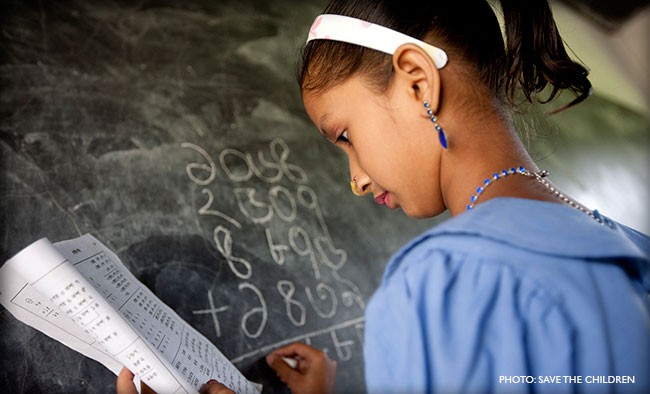
Although primary school enrollment in Bangladesh has increased, the quality of education remains low. Almost forty percent of all children who enroll in first grade fail to complete primary school, and only 2 percent of children achieve all prescribed competencies by the completion of fifth grade. USAID helps coordinate efforts among government and donors to maximize the impact of education initiatives and help children succeed early on in their education. By remaining in school, the country’s youngest generation is more likely to contribute to a prosperous future.
USAID early education activities nurture the untapped potential and diverse talents of young children, particularly among poor and disadvantaged families, to help them achieve their full learning capacity. We provide extra-curricular activities to increase learning skills, strengthen community involvement in school management activities, and train primary school teachers to use proven, successful teaching methods. This intervention will help ensure greater literacy and critical thinking skills in Bangladeshi youth.
USAID also focuses on improving children's reading skills within their first three years of primary school by training teachers to better assess the reading skills of their students. In doing so, teachers can identify which children are struggling and adapt their teaching methods to enhance reading comprehension.
In 2006, USAID support helped create the hugely successful television program, Sisimpur, the Bangladesh version of Sesame Street, which is the most widely viewed children’s television show in the country. An estimated 12 million young children tune into Sisimpur every week. The episodes aim to improve reasoning skills, such as literacy and numeracy, and hygiene practices like hand washing and teeth brushing. The programs also focus on portraying positive social and cultural knowledge, valuing diversity, and respecting others, including children with disabilities. Preliminary findings show that children who watch the program are doing better than their peers in literacy and math skills and are more likely to practice proper hygiene and have a positive attitude towards children with disabilities.
In 2015, USAID programs in Bangladesh:
- Improved reading skills of more than 295,000 young boys and girls in primary schools.
- Trained more than 2,400 teachers on how to assess students’ reading skills, such as letter recognition or reading fluency, and how to apply strategies to address any identified deficiencies.








Comment
Make a general inquiry or suggest an improvement.